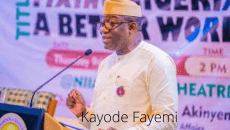Adeyemi Ope Akeju,Programme Director, Ekiti Homes Agenda, speaks with Adejuwon Soyinka, deputy general editor; Anthony Akaeze, senior assistant editor; Abiola Odutola, staff writer; and Sunday Adedeji, senior photo editor, on why the Fayemi administration embarked on the building of mass housing units across the state.
 What informed the idea of mass housing projects, often associated with mega cities, in a state like Ekiti?
What informed the idea of mass housing projects, often associated with mega cities, in a state like Ekiti?
There was an obvious need. If you look at Ado Ekiti today, rental is very high, and even when you find houses, the quality is a problem and if you are looking to create what we call mega city, you have to address that. Housing is inevitable. Any administration that does not address the issue of housing would have missed a very important thing. All developmental work that is going on will need to be supported by housing. It can be argued that housing should be an agenda of its own. What we have now is an eight-point agenda that is supported by housing. And the reality is, in this society, over time, we are going to need tens of thousands of houses. But do you create tens of thousands of houses at a time? No! We came up with the vision of 5,000 homes across the state to be deployed in phases.
We arelooking at areas where housing is a critical issue and make that our first phase, and that is what has constituted this stage one and it includes locations like Ado Ekiti, Ikare Ekiti and Otun. We also have places like Iddo. There’s a Federal Medical Centre in Iddo, we have a Federal University near Oye and Ikole, and so the first phase of the project is to look at those areas that have immediate need. But ultimately, the intention is to have an estate in every local government. The 5,000 are spread across a large number of locations over a time period.
What kind of buildings are you talking about?
The reality is that we have to cater for all segments. Remember it is a programme that is following a vision and every vision is about the future. Our approach is to create something for every segment and that suggests that we must be able to have houses that are affordable so that the low-income earners can benefit. It also means that we must provide houses for the high-class areas. We have a huge community outside Ekiti: Ekiti people in Diaspora. There are accomplished Ekiti men and women outside the state who don’t have a place at home. Some of them are retired. We are looking at that cadre. What we stress is quality and we are hoping that these houses will be in environments that are sustainable and contemporary. The idea is not cast in stone, and because we are working with developers, we allow developers to come up with a game plan too. We just want to work with them to ensure that we provide houses of quality and that are affordable. The estates that we have now, the ones that have kicked off, the entry point is N5.3 million, N5.5 million for a three-bedroom apartment. We have a three-bedroom detached bungalow at N6.5 million and also a four-bedroom duplex at N15 million.
What is the mode of payment for willing subscribers and is there a kind of mortgage arrangement for this?
This administration has had to consider all the funding options. If we had our way, we would build 5,000 houses and people would pay back in instalments, but that’s not possible, which is why we came up with this public/private partnership arrangement. A scheme like this without a mortgage scheme is pointless. We have the National Housing Fund, you can tap into that fund and take a loan till you retire with six per cent interest rate. We’ve also partnered with a couple of funders, one of which is Aso Savings, which has earmarked N1 billion for the Ekiti Home Agenda. And that N1 billion is geared for mortgages. This is their own fund and they will offer it at 15 per cent interest rate.
Normally they will offer it at 18 or 19 per cent but they’ve given us a discount for this programme. We have also been in touch with Shelter Afrique of Nairobi. We were there in April when they had their yearly convention and His Excellency, the Governor was there in December. They are providing funding for two things, construction funding and mortgages. They will bring mortgages into Nigeria at single digit. They are looking to put up about $100 million. So, there are mortgages but there are people who may want to pay cash and that will attract discount. And then there will be instalment approach.
Are there any conditions to accessing the houses like Lagos where you are expected to show evidence of tax payment?
We’ve had to do a research on this to know what people have done or what they are doing. We have had to come up with our own unique package. I must say that everything we do is informed by our circumstance. This programme is open to all indigenes of Ekiti, residents and visitors. But we probably cannot crystallise this until we have put something on the table. In terms of barrier, there is none. Everybody is entitled to it. But of course you will have to show that you are a fit and proper person and you will have to go through a mortgage process. The mortgage people will do their own due diligence.
Follow Us on Social Media


 WhatsApp us
WhatsApp us